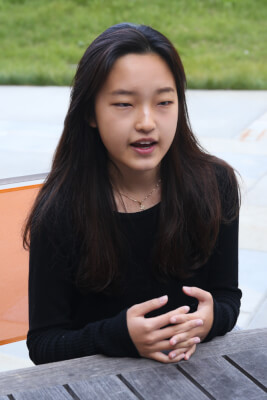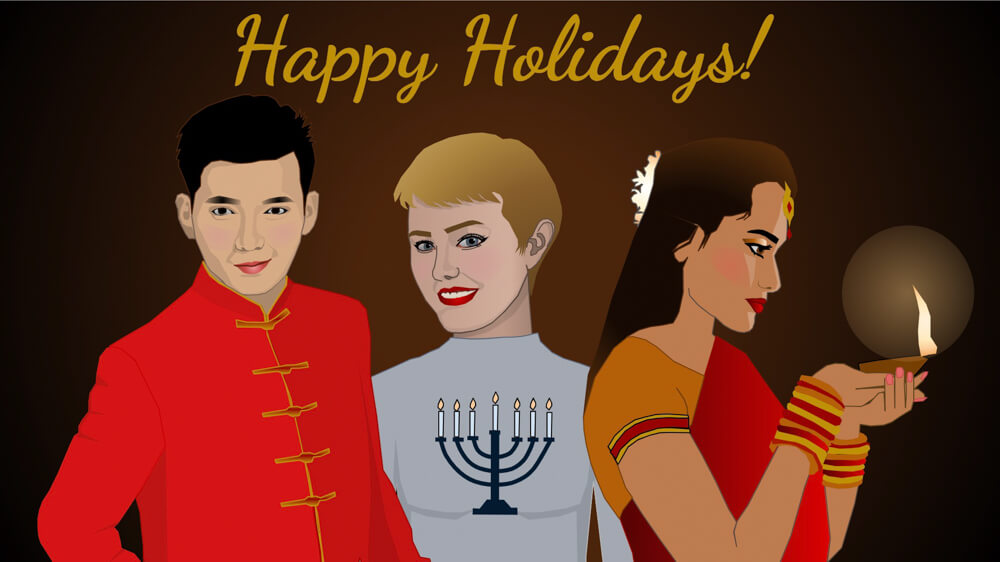With the end of the year approaching comes the beginning of the holiday season.
For many students at Occidental, holiday traditions stem from childhood memories. Molly Ellrodt (sophomore) is from New York City — a city bursting with holiday magic and cheer. As a child, her family would drive to their house in Lords Valley, PA a few days before Christmas for the holiday and buy their Christmas tree when they arrived. When she was 12 years old on Christmas Eve, Ellrodt and her family could not find any stores that were still selling fresh Christmas trees. After driving from store to store with no luck, a local supermarket employee told them where to find the trees stores did not sell before Christmas. They drove 30 minutes out of town to what Ellrodt described as a sketchy complex of buildings. Behind the buildings, in the middle of a field, was a pile of around 30 usable Christmas trees.
“And every year since then, we’ve just gone to this location, and there’s just this pile of trees that have been left over and you can just take one, and nobody knows that we take one,” Ellrodt said. “It’s always like this secret location — well, it’s not secret, because we know it.”
Ellrodt would dig through the pile, holding up trees to see if they were the best size to fit in their house. Then, they would tie the tree to the roof of their car and bring it home to decorate. Let the celebration begin!
Ahladini Veerina (junior) celebrates Diwali, the Hindu festival of lights. For Veerina, the holiday is about bringing in the new year with lights and optimism. First, her family will have a religious ceremony called a puja where they recite prayers and make offerings to their household deities. After, they would light candles known as diyas and decorate the outside of the house with lights. Veerina’s family celebrates Diwali on a smaller scale than she remembers in India, where the city would light up the sky with fireworks.
“I was terrified of fireworks when I was a kid. In India, they would have the kids go up and light the fireworks, but I would never ever do it because I was a little scaredy-cat. It’s kind of dangerous, now that I think about it,” Veerina said.

Heidi Kim (first year) grew up in South Korea where she and her family observed Chuseok, or Korean Thanksgiving. This year, the holiday occurred from Sept. 23 to Sept. 25 — but it is the last large Korean holiday of the year. There are two ways to celebrate Chuseok, according to Kim. Traditionally, families would visit their ancestors and honor their spirits. When Kim lived in South Korea, her family would celebrate the more modern way by cooking a large meal and gathering the family together.
“One of my favorite memories is making food with my cousins. Sometimes we would make kimchi all together because that requires a lot of work,” Kim said. “I don’t cook often, but I like cooking with my family.”
When she was younger, Nina Morse (sophomore) was obsessed with American Girl dolls. Her grandparents would send her packages of American Girl merchandise for Hanukkah. Celebrating Hanukkah set Morse apart from her classmates in elementary school in her hometown of York, ME.
“I liked that I was different from everyone in my class because they were predominantly Catholic or Christian and they all celebrate that, but I was like ‘Well, you guys only get one day of celebration and I get eight,’ and I used to get presents every day when I was little,” Morse said.
Since coming to Occidental, Veerina has not been able to celebrate Diwali with her family. She celebrates Diwali on campus on a larger scale than she is used to at home. During her first Diwali on campus with the South Asian Student Association (SASA), she was shocked by the large number of tables, food and people, but grew to love the community she found through it. This semester, Veerina is co-president of SASA and the club hosted a community Diwali celebration Nov. 7. Although planning the event was stressful, Veerina said it was worth it to share her traditions with the community.
For Sid Jain (senior), the way he celebrates Diwali on campus is also different than growing up.
“On Diwali eve night, at our roof, my sister and I used to throw a party just for friends and cousins and no parents were allowed. We used to light everything up, have floor beds, Indian snacks and diyas. So that night we would hang out on the terrace until midnight when we could watch the lanterns go up,” Jain said via email.
Maggie Rosen (sophomore) wouldn’t describe her family as super religious, but instead celebrates both Hanukkah and Christmas as a time for her family to get together. During Hanukkah, her grandparents will typically give her and her cousins gifts from their world travels. Last year, Rosen said they went to Japan and gave Japanese-themed gifts. Over the years, her dad also developed a new Christmas tradition she looks forward to.
“My dad gets scratch tickets for me and my cousins, so we’re all sitting and scratching and seeing if we won any money,” Rosen said. “The most I’ve ever won is $5.”
Christmas day in Kim’s house is not as large of an event as Chukseok. Korean families do not typically gather for Christmas because it is close to Chukseok. Since moving to the United States, Kim’s Christmas celebrations have been lowkey. She starts the day listening to her favorite Christmas song, “Mistletoe” by Justin Bieber. Then, her family will go last-minute gift shopping at an outlet mall for presents for her and her dad. Walking through the mall with her dog, Kim would hint to her parents what gifts she wanted. The day ends with a Christmas worship service at her church and dinner with other church families.
This will be the first year that Alex Lin (first year) will not be able to celebrate Chinese Lunar New Year with his family in Shenzhen, China. He compares the holiday to Thanksgiving, where families come together to share a meal. He considers himself a part of the modern urban family in China. In this modern era, Lin explained that he felt distant from the original traditions of the festival. For Lin, the holiday revolved around meal after meal with his family or at other houses, but after a few meals, it becomes overwhelming. One year, he was confused when the traditional meal included lobster, which is a Western dish, signaling a disconnect from tradition.
“It seems like my generation would, of course, continue to celebrate this, but I may not know how to celebrate. Growing up, I was limited to just the same experiences and the same meals,” Lin said. “I would say that there is perhaps this loss of culture, at least in the urban families.”
After moving to the United States, Kim said she does not celebrate Chukseok regularly. Family is an important part of the holiday, and it is hard to celebrate when the majority of her family is in South Korea.
When Ellrodt was younger, her family also celebrated Hanukkah in addition to Christmas. She did not know why, but over the years, the celebration faded away — they would light the menorah candles every night one year, but then less and less each year until they stopped. According to Ellrodt, the older you get, the less you need presents, and she eventually became disconnected from the gift-giving nature of Hanukkah, and later Christmas as well. She said she now feels uncomfortable asking for gifts.
“I feel like, when I was younger, you want those specific toys that everyone else has, but nowadays I don’t think there’s one specific thing I want,” Ellrodt said. “As the years go by, one, I think our parents get more presents because when we were younger it was about the kids and the kids would always get presents and toys.”
Morse’s relationship with gifts has also evolved since her American Girl doll days. She prefers giving and receiving homemade presents with sentimental value. One of her favorite foods to make as a gift is called “Christmas Crack” — according to Morse’s recipe, you pour caramel over saltine crackers to make a salted caramel bark, then you top it with a layer of chocolate. Morse likes to decorate it with nuts, peppermint or toffee.

Olivia Enos (first year) is from Sacramento, CA and spends Christmas day with around 25 of her extended family members crowded in one house. Enos is half Filipino, and for the holiday meal, her lola, which is Tagalog for grandmother, would make large batches of lumpia, which are fried Filipino spring rolls. Enos explained that now she and her cousins are preparing to continue the tradition.
“She [lola] is getting older now — she can’t make it much, so my aunt and my mom try to help. In the past few years, it’s been about teaching me and my cousins to make lumpia, which has been really fun,” Enos said.
Enos said she felt grateful to have a family so close and connected — her family is the reason she holds Christmas dear to her heart. Rosen came to a similar conclusion. Rosen is from Seattle, and now that she is at college, she has a newfound appreciation for her family and home.
“Now that I don’t live with [my family] full time, home almost feels like, more homey. Like I go home and I’m like ‘ah yes’ and I’m so calm,” Rosen said.
For many students, perhaps it really is the most wonderful time of the year.
![]()































